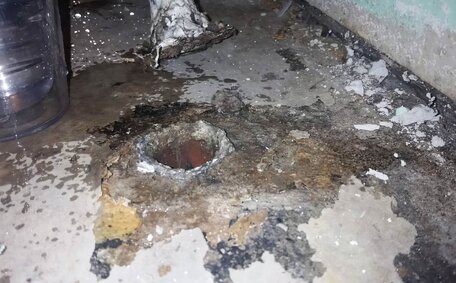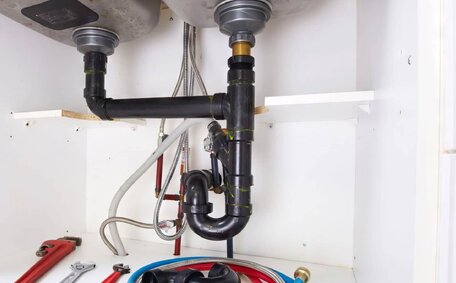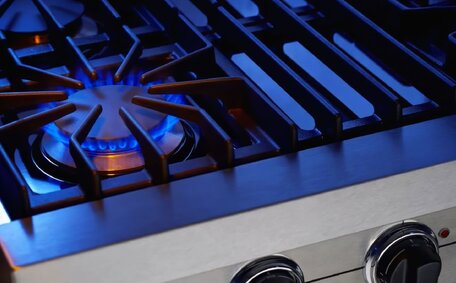Introduction to Gas Hot Water Systems
Many Australian households favour gas hot water systems for their efficient water heating capabilities. Used by around 40% of homes across the country, gas systems provide a cost-effective and environmentally-friendly solution for domestic hot water needs.
Our Master Plumbers, with ten years’ experience, excel in choosing and upkeeping the best-suited gas hot water systems, ensuring both comfort and efficiency for your home. In this article, we’ll be exploring:
- The various water heating systems on offer
- How to calculate the right size hot water system your household requires
- Operational costs of gas hot water systems
- Energy-efficient storage models and their impact on cost savings and emission reductions via advanced heating technology
Understanding these key factors will enable you to choose the ideal hot water system for your home.
Types of Gas Hot Water Systems
In Australia, the primary hot water systems are gas storage tanks and continuous flow models.
Storage Tank Gas Hot Water Systems
Gas hot water storage tanks heat and store water in an insulated tank, available in capacities from 50L to 400L. They involve:
- A storage cylinder or tank where water is heated by a gas burner inside the tank.
- A thermostat and burner to regulate water temperature.
- A flue for exhaust gas.
These units function as a hot water tank, heating batches of water in response to daily demand and maintaining it ready for use. Select a hot water heater size that meets your family’s needs, considering the average Australian household water usage of approximately 50L per person per day.
Instantaneous Gas Hot Water Systems
Instantaneous or “continuous flow water” gas systems function as pump water heaters, heating on demand rather than storing it:
- Water flows straight from the mains through a heat exchanger.
- Gas burners heat the water as needed.
- The water doesn’t need to be stored.
Continuous flow gas systems offer an unlimited supply of hot water and, despite needing electricity to operate, can be more cost-effective for homes with constant hot water use.
Storage vs Continuous Flow
Comparing electric to gas water heaters presents distinct differences, especially when evaluating storage tanks and continuous flow models:
Storage Tanks
- Store heated water for whenever it’s needed - good for households with sporadic hot water usage.
- Have relatively lower operating costs.
- Take up more space and require regular servicing/maintenance.
Continuous Flow
- Deliver an uninterrupted hot water supply on demand, suitable for homes with frequent or consistent usage.
- Compact size with basic installation needs.
- Use more gas to repeatedly heat water which increases operating costs.
The right system for your home depends on household size, water requirements, and space availability.
Fuel Types Used
When it comes to fuel types for gas hot water systems in the Bankstown area, you’ll typically be choosing between natural gas or LPG:
Natural Gas
Natural gas, frequently paired with solar heat pump technologies, is the most widespread energy source for water heating in urban environments. Over 90% of Australian homes connected to the mains gas grid use natural gas hot water systems.
As a cleaner-burning fossil fuel, natural gas uses more energy than some alternatives, but it nonetheless consumes less energy than electric storage hot water units and emits around 30% less CO2 when heating water. This makes it an environmentally friendlier option.
LPG
For households not connected to mains gas, LPG cylinders can power instantaneous or storage hot water systems. However, LPG is more expensive to run compared to natural gas and emits more greenhouse gases per unit of energy.
When selecting a fuel type for your gas hot water system, compatibility with your budget and operating expenses are paramount – thus, natural gas is commonly favored where it’s available.
How Gas Systems Work
Gas storage hot water systems use natural gas or LPG to heat water, ensuring you have the right hot water supply whenever you need it. Here’s how they work:
Storage Tank Gas Systems
A gas burner heats water stored in an insulated tank. A thermostat and control system in the storage water heater regulates the water temperature, commanding the burner to reheat as necessary. These systems work by heating batches of water at intervals to ensure there’s always hot water ready stored in the tank when you need it.
Instantaneous Gas Systems
These systems don’t store hot water.
Cold water flows straight from the mains through a heat exchanger. Electronic ignition gas burners fire up as water flows through to heat the water on demand. The burner output is controlled to precisely heat the water to a set temperature.
Despite differing operating principles, both gas and electric water systems are engineered for efficient water heating. The efficiency, gas usage and operating costs depend on factors like:
- Tank insulation
- Water heating speed
- Precision temperature control
- Household demand
When sized correctly and installed properly, the gas hot water system can offer an economical solution for heating water in Australian households.
Key Factors When Choosing a New System
Selecting a new hot water system involves key factors, including choosing the best gas options available:
Energy Efficiency Rating
Aim for systems with high energy efficiency ratings, ideally 5-6 stars, to ensure optimal energy use and lower operating expenses. A higher star rating equates to more efficient energy use, translating to lower operating costs.
Household Size
Assess how many people living in your home to determine the needed tank size or continuous flow output for your new system.
Water Usage
Estimate your household’s typical hot water usage to decide between a storage or continuous flow system.
Upfront Cost vs Long Term Savings
Gas systems, while considering the initial cost, can yield long-term savings and lower energy bills.
Prioritize eco-friendliness by choosing a natural gas system to minimize greenhouse gas emissions over LPG.
Weighing up these key buying criteria will help guide you towards the best hot water system for your home.
Installation and Maintenance
Ensuring your gas hot water system is properly installed and maintained is crucial for secure use hot water, peak efficiency, and prolonged durability.
Professional Installation
Gas systems should always be installed by licenced plumbers to ensure correct sizing, safe operation, and compliance with regulations. Attempting a DIY install risks leaks, explosions, or voiding your warranty.
Our team at Bankstown Plumbing has over 10 years experience safely installing gas hot water systems that are tailored to each household’s unique requirements.
Regular Servicing
We recommend servicing your hot water system every three to four years, which entails thorough inspection and crucial adjustments to elements like:
- Gas valves and connections
- Flues and exhaust
- Thermostats and sensors
- Tank insulation
Additionally, regular maintenance helps optimise the operation to heat your water effectively and avoid potential malfunctions. Protect your investment with regular professional servicing.
Contact our experienced team at Bankstown Plumbing at 1300 349 338 for reliable installation and maintenance of your gas hot water systems.
Comparative Cost Analysis
Upfront System Costs
The initial cost of gas solar hot water systems ranges from $1,000 for a basic tank model to $4,000 for a complete continuous flow system with installation.
Operational and Running Expenses
Annual operational costs, comprising gas consumption and maintenance, average approximately $300 for gas storage systems and $400 to $500 for continuous flow models.
Rebates and Incentives
Energy-efficient systems with a 6-star rating may qualify for STC rebates between $300 and $1200, varying by state. This helps offset both purchase and running costs for your new gas hot water system over time.
Balancing these costs with environmental advantages, user-friendliness, durability, and matching to your household size will pinpoint the most economical choice for a new gas hot water system.
Environmental Impact
Greenhouse Gas Emissions
Gas electric hot water systems typically release fewer greenhouse gases compared to solely electric storage units. Advancements in technology have enabled solar hot water systems to incorporate heat pump solutions, lessening the dependence on fossil fuels and cutting down CO2 emissions. This makes natural gas one of the cleaner fossil fuel options.
Eco-Friendly Gas Water Heating Advancements
The industry is advancing environmentally friendly gas water heating technologies, including:
- High-efficiency condensing gas heaters and superior heat pump hot water heaters that reclaim heat from the exhaust gases.
- Integrating renewable solutions with solar panels to enhance a solar hot water system’s efficiency.
- Hybrid heat pump hot water heaters which extract additional heat from ambient air.
- Improved insulation to reduce standby heat losses from storage tanks.
Although not completely emission-free, contemporary gas hot water systems offer a more sustainable option compared to older electric storage tanks. And continuing innovation means more eco-friendly solar water heating options are emerging.






